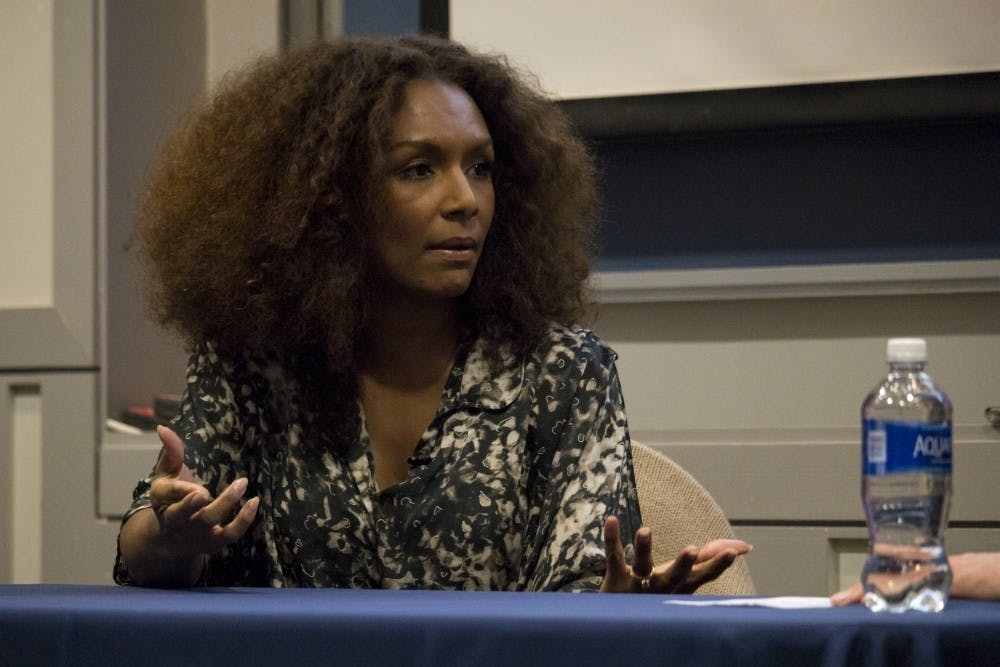
Last year, PAGE and the Women’s Week 2016 planning board invited activist Janet Mock to speak on campus.
Credit: Carson KahoeStudent groups at Penn regularly invite high-profile speakers to speak on campus. Depending on the honorary guest, the cost of a visit can sometimes reach up to $17,000 and other times be completely free. This multi-step process of obtaining funding can often be lengthy, unpredictable and filled with obstacles.
“We sent out hundreds of emails in the span of a few weeks asking people for funding,” said College sophomore Anisa Hasan-Granier, who serves as programming co-chair for the United Minorities Council. “So it’s definitely one of the more difficult aspects of planning events like this.”
For the UMC's annual Unity Month — a series of events hosted from Oct. 25 to Nov. 15 — the group is trying to raise over $12,000 to host social justice comedian Negin Farsad for this year's theme of “recognizing resistance.”
When student organizations host speaker events, they must first send representatives to present to committees that are tasked with allocating funds for the guest visits. These committees — such as Tangible Change, the Social Planning and Events Committee and the Intercultural Fund — comprise representatives from other student organizations who can designate funds to other student groups that apply.
This whole funding process can last up to nearly two months, and, as a result, often forces student groups to book guests during the summer in order to secure any fall visits.
UMC Financial Chair and Wharton sophomore Shamar Waterman, who sits on the boards of T-Change and ICF, said that collaboration and accessibility of events are some of the main factors considered during these votes.
“For example, high ticket prices might deter us from giving more than we might have had it otherwise been the event was free and accessible to all people,” Waterman said.
Student representatives who present to funding boards must be aware of the different restrictions certain committees have on funding. T-Change, for example, will not fund speaker honorariums and will only cover costs of the venue and food. When groups present to T-Change or ICF, their requests are voted on by students who have personal experience with the funding process due to their involvement in groups such as Lambda Alliance, Penn Association for Gender Equity, and the Asian Pacific Student Coalition.
Political organizations at Penn, however, can sidestep this fundraising process almost entirely.
Penn Democrats President and College junior Rachel Pomerantz said the group does not pay guests because political speakers cannot accept compensation, and most other speakers often visit on a volunteer basis in order to promote their message to students.
In order to cover other costs, such as the venue or food, however, political student organizations can co-sponsor events with other groups in order to get funding from the Penn Political Coalition.
This was the case at last Tuesday's town hall, which was coordinated by Penn Dems in conjunction with PAGE. The event welcomed Mary Donahue, the Planned Parenthood community resources manager, and served as "an opportunity for members of the Penn community to understand the state of reproductive rights not only in Pennsylvania but also the whole country," according to the Facebook event's description.
“Unlike groups that are able to get their yearly budget through SAC, we have to go through an ad hoc basis getting funding for each event,” Pomerantz said, “which, by that bureaucratic process, makes it a bit harder.”
The Daily Pennsylvanian is an independent, student-run newspaper. Please consider making a donation to support the coverage that shapes the University. Your generosity ensures a future of strong journalism at Penn.
Donate



